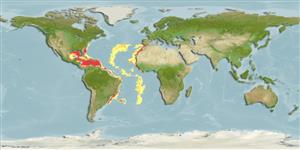Environment: milieu / climate zone / depth range / distribution range
Ecology
Marine; bathypelagic; non-migratory; depth range 610 - 1370 m (Ref. 3587). Deep-water; 37°N - 35°S, 98°W - 6°W (Ref. 1371)
Central Atlantic: Western Central Atlantic: Gulf of Mexico, Caribbean, and northeastern coast of South America. Eastern Atlantic: Morocco, Canary Islands, Azores and Portugal (Ref. 3587).
Size / Weight / Age
Maturity: Lm ? range ? - ? cm
Max length : 58.0 cm TL male/unsexed; (Ref. 1371)
Head bones and integument are relatively tough; eyes are of moderate size; chin barbels are long and prominent; adults over 30 cm have a pronounced hump-back appearance; caudal fin is absent; the first fin rays of the dorsal pectoral and pelvic fins are very elongated; body color is generally brownish; the fin membranes, mouth and gill chamber blackish (Ref. 1371). This species does not have light organs (Ref. 6187).
Captured together with the commercial red shrimp (Pleoticus robustus).
Life cycle and mating behavior
Maturity | Reproduction | Spawning | Eggs | Fecundity | Larvae
Cohen, D.M., T. Inada, T. Iwamoto and N. Scialabba, 1990. FAO species catalogue. Vol. 10. Gadiform fishes of the world (Order Gadiformes). An annotated and illustrated catalogue of cods, hakes, grenadiers and other gadiform fishes known to date. FAO Fish. Synop. 125(10). Rome: FAO. 442 p. (Ref. 1371)
IUCN Red List Status (Ref. 130435: Version 2024-1)
Threat to humans
Harmless
Human uses
Fisheries: of no interest
Tools
Special reports
Download XML
Internet sources
Estimates based on models
Preferred temperature (Ref.
123201): 5.2 - 10.6, mean 6.7 °C (based on 116 cells).
Phylogenetic diversity index (Ref.
82804): PD
50 = 0.5001 [Uniqueness, from 0.5 = low to 2.0 = high].
Bayesian length-weight: a=0.00372 (0.00141 - 0.00976), b=3.11 (2.88 - 3.34), in cm total length, based on LWR estimates for this (Sub)family-body shape (Ref.
93245).
Trophic level (Ref.
69278): 3.1 ±0.1 se; based on size and trophs of closest relatives
Fishing Vulnerability (Ref.
59153): Moderate vulnerability (43 of 100).
